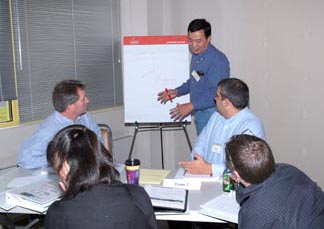Cornell workshop in Geneva connects science with business
By Joe Ogrodnick

A growing number of Cornell researchers today believe they have an idea for a start-up company. However, the marketplace requires more than a new product.
To help such entrepreneur wanabees bridge the gap between lab research and a seed stage -- or start-up -- company, a Pre-Seed Workshop was held Nov. 3, 4 and 11 at the newly opened Cornell Agriculture and Food Technology Park (CAFTP) in Geneva, N.Y.
The intense hands-on start-up workshop taught participants how best to investigate early stage, high-technology ideas and assess their potential as the foundation of a start-up business, licensing opportunity or new product within an existing business. Roger Williams of Cornell's Center for Life Science Enterprise organized the event with assistance from Jennifer Drumluk, special projects coordinator with the Cornell Center for Technology, Enterprise and Commercialization (CCTEC); Daniel J. Fessenden, executive director of CAFTP; and Robert C. Seem, professor of plant pathology at the New York State Agricultural Experiment Station in Geneva and president of the CAFTP board of directors.
The Center for Life Science Enterprise, funded by the New York State Office of Science, Technology and Academic Research (NYSTAR), is the technology transfer unit of the Cornell University Institute for Biotechnology and Life Science Technologies.
"If the initial success of this and similar workshops can be measured by the energy and enthusiasm of the participants and the quality of the business cases developed, then this workshop was a success," Williams said. "The real success, going forward, will be the transfer of the technology into actual business opportunities."
The workshop was created by Mark Wilson, an entrepreneur-in-residence at the University of Rochester, and colleague Judith Albers, vice president of the venture capital firm Trillium Group. University of Rochester director of technology transfer Mark Coburn tapped Wilson about two years ago to help prepare university-related start-up companies for a local technology venue.
Williams has long held a passion for the "pre-seed" stage of technology transfer and brought the workshop idea to Cornell after experiencing a presentation by Wilson and Albers. A pilot workshop with three Cornell idea teams was held in October 2004, and plans for the Geneva event got under way.
The Geneva workshop included a motivational talk by Ontario County Administrator Geoff Astles and a talk-show type interview between Wilson and Jack Henion, Cornell professor emeritus of population medicine and diagnostic science, who also is president and CEO of Advion Biosciences Inc. Henion shared his science-meets-business experiences and left attendees with a trick of the trade: "My partner was the business guy; I was the science guy. He learned a lot about science, and I learned a lot about business."
Workshop participants were organized into five idea teams that participated in two intense, one-day sessions separated by one week of homework. Each team was formed around a central technology, product or business idea brought in by one of the participants, who was designated an idea champion. A technologist, an MBA student, a local start-up coach and (in some cases) an attorney completed each group.
The curriculum centered on determining the commercial aspect of an idea, assessing team members' start-up fortitude and organizing the idea so that it could move forward. Teams had to answer several core questions, including Do you have a product? To whom will you sell? and How will you operate?
"It's a head-on, hands-on way to address tech transfer," said Williams, who hopes to build the pre-seed workshop concept into a routine offering for new entrepreneurs at Cornell.
Workshop facilitators Wilson and Albers introduced each topic or question with a short PowerPoint presentation. The groups then went their separate ways for discussion and brainstorming on that particular topic. Their homework was to collaborate via e-mail and phone calls and develop a PowerPoint presentation on entrepreneurship and start-up companies. The presentations were made on the workshop's second day to attendees and a panel of experts that included Cornell graduate Zach Shulman of the Cayuga Venture Fund. Shulman also teaches a course at Cornell's Johnson Graduate School of Management.
Technology leaders on two of the teams were Cornell scientists: Desen Zheng, research associate in the Department of Food Science and Technology at the Geneva Experiment Station, and Kathleen Hefferon, a consultant from CCTEC. Both have projects already under way.
Zheng outlined a plan for "Berrigen Biotechnologies," which will develop a transgenic raspberry for a model system to evaluate the anti-cancer effects of fruit components and then market the improved raspberry varieties. "The company's mission is to promote consumer health through improved nutritional content," Zheng said.
Hefferon talked about Vitis Biosciences, a company in which she is participating that will develop and market disease-resistant grapevine rootstocks. "Grapevine fanleaf virus is the biggest threat grape growers around the world currently face," she said. "Despite roadblocks which include public perceptions of GM [genetically modified] foods and growers' resistance to changing their vineyard practices, this is the only viable solution." The final slide in her presentation summed up the company's ultimate goal with a play on words from a Steinbeck classic: "Saving the Grapes From Wrath."
Both scientists said they benefited from the process and plan to set up shop at the Agriculture and Food Technology Park in Geneva.
Other Cornell participants in creating the workshop were the Johnson School and the Cornell Center for Materials Research.
Media Contact
Get Cornell news delivered right to your inbox.
Subscribe